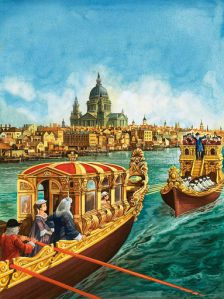 “Schindler gave me my life, and I tried to give him immortality.” So spoke Poldek Pfefferbeg, a surviving Schindlerjuden and the man responsible for introducing Thomas Keneally to the extraordinary story of Oskar Schindler.
“Schindler gave me my life, and I tried to give him immortality.” So spoke Poldek Pfefferbeg, a surviving Schindlerjuden and the man responsible for introducing Thomas Keneally to the extraordinary story of Oskar Schindler.
As a result of Steven Spielberg’s Oscar-winning film, Schindler’s List, many are already familiar with how Schindler saved some 1200 Polish Jews from the Auschwitz and Gross Rosen extermination camps in southern Poland during World War II.
A Sudeten German and industrialist, originally a member of Hitler’s National Socialist Party, Schindler was a hard-drinking womaniser who exuded charm and influence. It was opportunism and profit rather than anything significantly humanitarian that initially motivated him. With the German invasion of Poland in 1939, he acquired Emalia, the enamelware factory in Krakow that was to save the lives of so many. Using contacts and bribes, he built up the factory to include the making of armaments – a financial windfall but also key to its protection as the war dragged on.
Initially disillusioned, progressively more and more angered and disgusted with the inhumanity of Nazi policies towards the Krakow Jews, Schindler established, at great personal expense, protective factory policies for his ‘highly skilled workforce.’ He witnessed the cleansing of the Krakow ghetto and treatment of men, women and children alike. Thousands were murdered whilst those with the all-important work card were transferred to the Krakow-Plaszow work camp under the control of the monster, SS-Hauptsturmführer Amon Göth (“When you saw Göth, you saw death.”).
Availability of land, diamonds and a great deal of luxury black market foodstuffs facilitated Schindler in the building of a camp for his inmates separate from Plaszow – with no SS guards allowed on the premises. At a time when starvation rations were doled out (Goth sold much of the camp supplies on the black market), Schindler purchased bread and chickens for his workforce.
He repeated the building of a camp at Brunnlitz, close to his birthplace of Zwittau, when, in July 1944 and with the threat of the Red Army, the Germans began to retreat west. Instead of incineration or the long death marches of the Final Solution, the Schindlerjuden found themselves in a second work camp in the Sudetenland foothills. The workforce survived, liberated by the Russians in 1945. As a member of the Nazi Party and Abwehr, Schindler risked execution but had already fled west.
Keneally’s novel, based on numerous eyewitness accounts, is a desperately moving testament to the horrors of Hitler’s attempted genocide of European and north African Jewry. The horrors of action are almost unimaginable – thousands of people killed daily, thousands others barely alive. But in telling Schindler’s story, Keneally focuses on the memories of the survivors and the fragility of that survival.
It’s a true story, a remarkable story of a remarkable man. Schindler wasn’t perfect – Schindler’s Ark is a reality of a man who was neither ”good” nor ”virtuous”. But he was humane, principled, charming and a chancer – for years he managed to make Göth believe they were friends, plying him with alcohol, cigars, foodstuffs to ensure the possible survival of a secretary or maid.
It’s a hard story to read. And not just emotionally of the mostly harrowing individual stories. In documenting the eye-witnesses accounts, there’s a great deal of detail which is important to the validity of the story but unfamiliar to German military titles, for example, can get very confusing (Oberführer, Oberstgrüppenführer, Hauptsturmführer, Standartenführer and more).
But, at its core, Schindler’s Ark, whilst diluted in impact 35 years after its writing, is an extraordinary achievement. It was awarded the 1982 Booker Prize.
Advertisements Share this:




